T.A. Barron's Blog, page 16
April 27, 2017
Nature: the Ultimate Source of Balance, Inspiration, and Magic

I remember the very first time I saw the stars on a high mountain ridge in Colorado. It was a clear summer night; no artificial lights distracted from the vista. The evening was calm, but I could feel a gentle breeze, lighter than an owl’s feather, tousling my hair as I gazed up at the vast sky. There were so many stars, all so bright, I almost had to squint just to look at them. That vision filled me with wonder, awe, and mystery—what William Wordsworth called “a presence that disturbs me with joy.”
On that summer night, I realized for the first time that being in nature, in wilderness, I could feel at once both very small and very large. We can be dwarfed by the grand sweep of the stars, the oceans, and the mountains, and yet still be part of it all—connected to the miracle of the first daffodil to emerge from soil still dusted with snow, the fragrance of a new lilac or an old oak leaf, the feel of a raindrop rolling down the face, the taste of a sun-ripened peach, or the spiralling song of a meadowlark.
In nature, we can know that, even as small and short-lived as we are, we still belong to the universe. We are still part of all that everlasting grandeur and mystery.
I also discovered something startling—something truly radical in today’s hyper-connected, noisy, stressed, and overwrought world: nature can be a wonderful friend, a source of true healing and inspiration.
The curative powers of nature are real and powerful. Researchers at England’s University of Exeter Medical School examined data from 10,000 city dwellers and discovered that those living near green space reported less mental distress. And Dutch researchers have found a lower incidence of 15 diseases—including depression, anxiety, and migraines—in people who live close to some green space.
In addition to the sense of well-being and peace I feel when I’m in nature, I also feel inspired. I often say my best ideas come from life itself, and that’s especially true when I’m immersed in nature. Experiencing the intricate wonders of a wildflower meadow or a rambling river opens all my senses: I smell, hear, taste, touch, and see many things that make me feel fully alive.
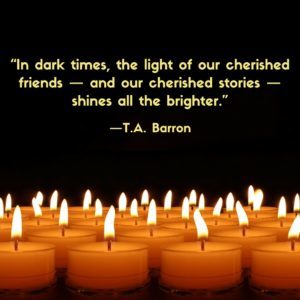 We need the inspiration nature brings, especially in times of turmoil. Just as we rely on stories to understand our lives and our world, we yearn to comprehend the greater story that is being told all around us, a story whose pages turn to the rhythm of cosmic time. And in nature, that greater story reaches out and tousles our hair.
We need the inspiration nature brings, especially in times of turmoil. Just as we rely on stories to understand our lives and our world, we yearn to comprehend the greater story that is being told all around us, a story whose pages turn to the rhythm of cosmic time. And in nature, that greater story reaches out and tousles our hair.
I truly believe that saving the Earth is about saving our fellow creatures—as well as ourselves. I can’t quite give up on this home planet of ours. Yes, it is beleaguered and trashed and attacked on every level. That we know beyond doubt. But it is also full of enduring wonder, beauty, and mystery—a place that nourishes us physically and spiritually every single day.
Despite the ways we’ve mistreated it, the natural world holds enormous powers of resilience. Nature will survive, with or without us. Wouldn’t you like to survive, as well?
On this Earth Day, I hope we will all take time to explore outdoors. Take a child with you—and take your inner child, as well!
Enjoy your time in nature, this day and every day you can. Feel its inspiration, sense its healing powers, and commit to doing your part to protect it.
This entry originally appeared on The Huffington Post.
February 24, 2017
More Magical Origin Stories… By Fans Like You!

In my last blog entry I shared a few of the entries from my recent Origin Story contest. The competition invited fans of my books to imagine the background of any character from one of my books, and write a short piece of fiction outlining their history. I can’t tell you how pleased I am that so many of my readers took up the challenge… and did it so well!

In Tree Girl, young Rowanna lives in a cottage by the seaside, but and longs to see the great forest, and especially the mysterious High Willow tree which sits on a faraway hill. In her story, Charlotte M. writes from the perspective of one of Rowanna’s animal friends, just before their first encounter:
Eagle’s Beginning
The softness of mother’s feathers is all around me, warm and dry and safe high up in the big tree by the sea. I push my head through mother’s down to peer over the edge of the nest at all that happens below. Someday I will spread my wings and fly like the gulls. I will fight great battles and conquer monster fish. A branch comes to tickle my scrawny breast feathers, as if the tree could hear my thoughts. He is always teasing, this tree. I snap my beak at him, furious that he should be mocking me, the fiercest of warrior birds. The breeze that rustles his needles sounds like laughter. I squawk at him, struggling to hop out of the nest and show him what I’m made of. Mother gently tucks me back into the fold of her wing, trying to soothe my righteous rage. I calm, but this is one fight that I’ll come back to. No one mocks me and gets away with it, not bird, not sea, and certainly not tree. Mother settles over me as the great big orange sun dips into the waves. Her feathers ripple like the sea as the wind picks up. I’m not afraid, but I know she is. I can feel her heart beating faster. There’s something wrong with the air. The usual tang of salt and fish is stronger, mixed with—with a smell I haven’t smelled before. When I ask mother, she doesn’t answer, fluffing up against the gusts. I tuck my head under my own wing, trying to go to sleep. In the morning all will be well. She will bring me a delicious breakfast of mashed worm, and the sun will shine again. I have not been on this earth long, and already I know the dawn brings with it a new warmth, inside and out.
A fierce cold burst of wind wakes me in the darkness. I lift my head, calling for mother, but she does not come. The gusts are brutal now, shaking the whole tree, sending his needles flying. Again I cheeyup in panic, crying for her. I dig my sharp claws deep into the thatch and seaweed nest, hanging on for dear life. A terrible blast dislodges the nest beneath me, sending me spinning through the air. If I could fly away, I might be able to find shelter, but my wings are too small, too fragile. I squeeze my eyes shut, trembling, helpless. Pain rips through me, bending one of my wings in half as the wind slams me hard against the stone wall of the humans’ nest. Darkness covers my mind like a cloud over the sun. Every tiny bone in me hurts. Sleep is such a relief. Mother—I manage to call one last time, where are you? I think I see the spirit of the tree—an old man with a beard—detach from the trunk to cup me in his rough bark hands, to lift me up and place me somewhere safe.
Yellow sunlight burns my eyes as I crack them open. I can barely lift my head to peer out at the world. Mother has not come back. Still I call for her, loud as I can, which isn’t much. Cheeyup. A new sound reaches me. A voice like a bird’s, but not. Cheeyup. A singing voice. Cheeyup. The steady patter of footsteps drawing closer. A shadow blocks the sun, a friendly freckled girl face peering over the edge of the nest at me. Frightened, I nip at her fingers as she reaches for me. Soft hands enclose me, slipping me into a warm place. I can feel her strong heart beating, soothing. My fear fades. The girl smells of sea and fish and tree. She smells of life. I am Eagle, fierce warrior. Someday I will fly. Until then, I will protect new mother with all my strength.

The background of the bumbling, plaintive jester who appears in Merlin: The Seven Songs was a popular subject for fans. In his story, Dan T. imagines how the fellow ironically known as “Bumblewy the Mirthful” may have got his start:
A Child’s Choice
” . . . But what about magic, and dreams? Or even just not having to struggle for food?”
“You’re a real jester, Alfred,” Mrs. Bumblewy replied. “I swear, you’re destined to make people laugh. Every day it’s a new story. A different life, hope. Your father certainly never planted those ideas in your head. I wonder where you got them from.”
Alfred paused before answering, bobbing his bucket-shaped head in a curious fashion. “Books, I suppose.” His shoulders sagged beneath a short tunic. The tattered breeches he wore were his only additional clothes.
“Books are lies, and you’re an idiot,” Mrs. Bumblewy declared. “We’ve got a sick cow, dry dirt for a garden. Your father’s . . . don’t get me started on your father . . . and you’re talking about magic. Peddle your tales to Esma. Maybe then she’ll produce some milk.”
Mrs. Bumblewy stormed past the small bookshelf and out of the one room shack, shaking her head in a swift, jerking motion that caused her bun to unravel slightly. They did not even have a door anymore. One of the hinges broke last year, and instead of trying to mend it, Mrs. Bumblewy had ripped the other hinge off in a fit of rage and then flung the door onto the woodpile outside, where it still lay. Alfred would have fixed it, he was rather good with his hands, but he liked the unimpeded sound and smell of the rain. That is, when the rain came, which was not very often this summer.
Alfred’s freakishly bushy eyebrows frowned, an expression that did not quite reach his lips. His chin was shaped like an old sagging apple and there was something abnormally fleshy about his neck. He absently fingered the small knife in his boot, thinking that maybe he could find some would to carve at the hemlock grove. He was capable of sculpting nearly anything, and in striking detail. His mother did not know it, but beneath the leaf and grass pallet he slept on in the corner of the shack, there was a collection of miniature animal figurines: squirrels, wolves, ducks, and other creatures, even a mermaid. He often fantasized that they would someday come to life and frolic with him in a pastoral paradise, somewhere far south, where he had heard the land was emerald green and fruit trees grew heavy all year round. But his mother was right. He was an idiot. Perhaps he was destined to be a foolish jester. Abruptly, his eyes brightened. At least jesters could still read books.
As he stepped out of the shack and into the hot reddish light, a bead of sweat slipped down his back. In all of his twelve years, he had never experienced such stifling heat, especially just after sunrise. Perhaps it was some sort of weather cycle he had heard that seed-selling otter talking about. Or maybe there was an evil force about that was compromising the land. Some of his books spoke of such things.
The dry plains to the south were a sickly orange color, dust rising through the red rays of the relentless sun. Esma, the emaciated cow, sniffed hopelessly at the ground. Mrs. Bumblewy was beating at the dead garden soil with a hoe, as though ferocity would force something to grow.
He rounded the shack to be out of his mother’s eyesight and sat down beside a frail oak tree whose leaves were drooping and browned. One grey sparrow sat in the branches, its ordinarily swift movements now lethargic as it turned its head dismally from side to side in a half-hearted search for a worm.
Everything appeared hopeless. Perhaps that was simply the way of things. The thought was strangely comforting and Alfred was inspired to begin singing. His monotonous, cracking voice sounded something like two stones rubbing.
“The sun is hot, and the ground is dry
I wish I knew how not to cry”
The sparrow turned its head slowly toward the hideous noise, blinked its eyes once, and took off into the red sky. Watching it soar, Alfred attempted to smile but his lips trembled and ultimately settled into a frown.
“A Jester,” he muttered, bobbing his head. “Too true, too true.”

Merlin’s very first companion — Trouble — is one of the most beloved by readers of the Merlin Saga. Perhaps it’s because what the young bird lacked in size, he made up for with his deep loyalty to his wizard friend. In her story, set before the events of Merlin: The Lost Years, Nicole B. imagines how the little bird had big things in his heart right from the beginning:
Trouble from the Start
Ever since the young merlin first poked his head through his shell, he was trouble. Loud and ever-demanding of his parents’ attention, much to his siblings’ annoyance, he more than once almost caused one of them to fall from the nest. Despite all this, his parents were quite proud of his brazen nature. His mother in particular knew that he was destined for great things, though she knew not just how great those things would be.
The troublesome bird was the first to attempt flight, as well as the first to succeed fully. And oh how he loved to fly. Even at that young age, he had a sense of adventure. Every time he took off from the nest, he felt something in his breast that seemed to call to him, telling him to fly far, far away to…somewhere. Some place where fate awaited him. His mother had to keep a close eye on him, otherwise he would have tried to fly halfway across Fincayra and no one would have known the better.
He was more than eager to leave the nest so when the time finally came, he needed no encouragement from his parents. He left just as the sun was peeking over the horizon. Soaring high in the sky, here at last the merlin truly felt free to follow that tugging in his heart. Swift as the wind, he flew farther than he had flown before. The lands that passed beneath him piqued his curiosity but the tugging sensation was incessant, thus he did not stop nor did he slow down. For some reason he felt that he would be seeing these lands again before too long, and he would not be alone. The idea of this comforted him yet excited him more than ever, and so on he flew, towards his destiny.

Thank you to every single one of my fans who took the time to explore their imaginations and write the untold history of one of my characters. It is one of my greatest joys as a writer to be able to share the journeys of these characters with my readers, and it is deeply touching to me to see just how fully these stories have come alive for you all. I look forward to the next opportunity to read your amazing creative works!
February 21, 2017
Magical Origin Stories Written by Readers

Exploring stories of untold beginnings has always appealed to me as a writer. My Merlin Saga began after I wondered about the early life of the man who became the wise and powerful old wizard we know so well from the tales of Arthurian legend. And instead of focusing solely on the mystery of the magical island’s disappearance, my recent Atlantis Saga begins by imagining what may have happened to trigger its creation.
With this in mind, I recently invited fans of my books to dig deep into their imaginations and write their own origin stories for any character from one of my books. The results were simply fantastic! Of course, I knew my fans were a talented bunch, but their creativity and enthusiasm for these characters and their stories was a joy to read. And now that the contest is complete, it is my great pleasure to share some of the winning stories with you.

The loyal and fierce Trouble is one of the companions of Merlin who is most beloved by fans of the Merlin Saga. Alexandra L. shared this entry outlining the early life of Merlin’s feathered companion who first appears in Book 1, The Lost Years:
Early Trouble
As the life of Druma Wood began a semi-silent vigil for the farewell of the day, a new life was welcomed. Eywak’s trained eye watched unblinkingly as the small life made the first dent on the shell. The blue bill struggled valiantly, as if determined not to spend another anxious moment away from this splendid world. At last, the fledgling emerged from the shell, everything in perfect condition.
After naming her youngest Rywan, which in the language of wind meant ‘true spirit,’ Eywak turned to his shell and read. She shuffled her wings nervously. Along the inside of the shell were the lines of a short yet very defined life, it spoke of fierceness, and a loyalty that never faltered even in dire moments. Through time, his troublesome nature would deem him another name. The falling sun and shell spoke of all things that were yet to pass.
But for now, he was just a young hatchling catching his first sunset learning to listen to the wind. And like all young hatchlings….he was hungry.
***
Being the youngest of his clutch of fledglings had its advantages such as being guaranteed the warmest spot under their mother’s wing each night. It also had its disadvantages. Whenever his parents set out to bring food or scout the area, Rywan was left unprotected, and being the smallest of the trio, became the main source of entertainment. The older fledglings chased him around in their small nest and pretend he was prey. Rywan, already feisty by nature, learned to channel his warrior spirit or faced being sat on and pecked until his parents returned, which had happened one too many times.
Now, feeling quite bold at three weeks old, Rywan screeched a particularly rude phrase at the eldest fledgling that would have gotten him pecked by his mother and earned an approving chirp from his father. Shocked, the elder of the trio screeched back, and so they engaged, until Rywan charged. He jumped, flapping his wings eagerly, ready to land on the edge of the nest.
Except something curious happened.
The world suddenly became a blur of colors. He was falling! Branches swayed, trying to slow the little ones fall until….thump! A dazed fledgling, otherwise unharmed, landed on pile of vivid green leaves. Feeling even smaller than he ever had before, Rywan chirped quietly, but all that answered back was the swaying of the mighty branches around him. He continued chirping anxiously until he heard a scuttle. A pair of beady eyes surveyed the scrawny looking bird. Not enough for a meal, but a snack would do.
As the creature slinked from the foliage, Rywan’s heart fluttered. This looked like a rat that had once come near their nest. His mother constantly warned the fledglings about the dangers of rats, only to quickly reassure them that she’d keep them safe. But she was not here now. No one was here. Rywan, very much alone and helpless, froze with fear as the rodent approached.
Then, the wind blew softly through the forest floor. Rywan’s screeched with fierce determination; the spirit of the wind gave him courage. As the rat leaped, Rywan leapt higher knocking the rat with the wings he had yet to fully master. The rat, now annoyed at losing the prospect of an easy meal, attacked only to be met by Rywan’s claws. A matter of minutes seemed like an eternity to the little warrior before two familiar screeches resounded through the battlefield. In a blur, his mother finished off the enemy while his father struggled to carry his youngest back up to the safe nest.
Throughout the evening, while his mother kept chirping about his troublesome nature, Rywan felt like a seasoned warrior. Never again was he prey to his other nest mates for he had learned that size was certainly no measure for all the great things his young life could accomplish. That and he would never pass up an opportunity to challenge a rat.
***
The following summer, Druma Wood was a place of pure poetic motion. The land swayed with illuminating shades of vivid greens and yellows, and the sky danced on blue, violet, and orange wings. On one peaceful day, the wind called to Rywan and set him on course to the silvery edge of the Druma Wood. This would be a journey far greater than any, where a destined meeting would take place, and a series of magical adventures, awaited.

You might remember Bumblewy as the desperately un-funny jester who appears in Book 2 of the Merlin Saga; Bryan B. tells a story of what may have happened before he encountered the wizard:
The streets of Caer Neithan jingled with festivities as Bumbelwy ambled along on his not-so-merry way. Sure, the Town of Bards always bustled with music and song, but today proved to be different. Today was the first day of Summer. Bards from all over came to Caer Neithan for this special occasion, multiplying the usual melodies and rhythms tenfold.
It only gave Bumbelwy a headache.
He never cared much for how shiny the bells were on his hat, or how many balls he could juggle at once. He wanted something grander than those foolish things! He wanted to captivate his audience with laughter! Keep them on the edge of their seats, waiting for the punchlines and the rhymes. And after the show, they would make their way home and remember his words, and the wisdom he’d injected into his wits.
Oh, to inspire the masses with laughter!
His fellow bards and jesters sneered at his idea. When his neighbors complained that he scared the birds away with his voice, he would only retort, “I blew them away with a magical performance!”
Nothing could stop him from attaining his goal of becoming a great bard. Nay, the greatest bard!
This goal had brought him out of hiding on the high holiday of cheer and festivities. He sought an audience.
At the town square, Bumbelwy managed to squeeze in between two jesters throwing balls to one another. Under an arch of a blur of red and blue balls, Bumbelwy crafted his stage.
He ran his fingers down his lute, plucking at the strings. Not completely in tune, but close enough for him. When he cleared his throat, he almost choked on his own saliva.
“Here ye! Here ye!” he wailed. “All be joyful and have some cheer! The jester is here!”
One person clapped. Once. Or perhaps they swatted at a fly. No matter, Bumbelwy took no notice. He lifted his lute. Dramatic pause. Then, the story began.
Oh, little flower
No one has watered you for days,
Your pastel pink has gone to gray.
Why have they forgotten, why do you think?
Could it be, in truth, that you stink?
The last note lingered, resonating under the incessant pattering of the juggler’s balls. Bumbelwy’s eyes remained shut as he basked in the overwhelming rush of emotions of his song. Such profundity! Such humor! The wave of laughter, oohs, and ahhs, was only a moment away, he was sure of it.
The onlookers shuffled their feet. One of them coughed.
Something struck Bumbelwy upside the head, and he almost lost his balance. A red juggling ball slapped the dirt near his left foot.
“Sorry, it slipped,” the juggler muttered as he retrieved his ball. He added hesitantly, “Um, I don’t think they liked that one, sir.”
Indeed, it appeared so. He only received blank stares and a rotting tomato that was fortunately horribly misaimed.
Disheartened, Bumbelwy only slumped away.
Did no one like his stories? It seemed hardly a likely possibility. Surely there was some merit deep down in his stories!
“You!” a voice cried out. Bumbelwy glanced to see a bard leaning in the doorway of the inn. He did a double take when he realized who had spoken to him.
“Taliesin?” Bumbelwy blushed. The most famous of all bards in the land. The man had so many stories, it was said that he had stolen from a witch a magical potion that gave him the ability to see into the past and future.
“Bumbelwy, don’t be disheartened by the audiences. They are always hard to please,” Taliesin told him.
“Too true, too true, too true,” Bumbelwy muttered. “Would you tell me something, Mister Bard?”
Taliesin shrugged. “I can tell you many somethings.”
“You can see the future . . . will I make a single person laugh in my life?” Taliesin simply cleared his throat and recited a mysterious verse:
I have been a sword in the grasp of a hand,
I have been a friend that you’ll need,
I have been a worm in a cave,
And you . . . well . . .
Taliesin took a step forward and placed a hand on Bumbelwy’s shoulder. “You shall see.” With that, Taliesin vanished into the inn, leaving Bumbelwy without an answer.
“What does that mean?” Bumbelwy asked himself. “You shall see.” See what?
He may have left him without an answer, but what Taliesin gave him was worth more. He had left him with inspiration.
“Or . . . was that a warning?” Bumbelwy mused as he headed home.

If you’re a fan of my Merlin Saga, you’ll know Rhia is a major character who first appears in Book 1, and who continues to be a main character from Fincayra to Avalon. In her story, Hannah S. imagines the answer to a fundamental mystery: How did Rhia become separated from her family, and what first drew her to Druma Wood and her home in the great tree Arbassa?
The game had gone horribly wrong somehow! They were only playing hide and seek, though they were nearer the woods than Mother would have liked. But how was that any different than playing in a large castle where one could still easily get lost?
Little Rhiannon sat huddled behind a bush, her lip beginning to quiver as tears simultaneously welled in her eyes. It was getting dark, and she hadn’t heard or seen anyone come near her. Where was that brother of hers? Rhiannon’s thoughts then turned to her mother–oh, how she wanted her now! Immediately, the idea came to go looking for her lost family. Summoning all the courage she could muster, Rhiannon stood up and walked a few cautious steps from her hiding place. Her blue-gray eyes darted in every direction, and saw nothing but trees and darkness.
Suddenly feeling very alone, Rhiannon whimpered. Shadowy figures seemed to loom all around her, and the mysterious noises of the night now reached her ear. Uttering a small cry of fright, the child dashed away as fast as her little feet could carry her. She had no concept of where she was going, but she hoped desperately to see the end of the forest and a clearing toward home. On and on she ran, her tight curls bouncing wildly, only to finally collapse in a pile of leaves. Tears now streamed down Rhiannon’s cheeks, and if anything, her sobs drowned out any other noise she might have heard. Within minutes, she fell asleep from emotional and physical exhaustion.
It was daytime when Rhiannon awoke, though the dense trees of the Druma Wood hardly let in any sunlight. Rubbing her reddened eyes, Rhiannon once again surveyed her surroundings. It all looked exactly the same to her, with one exception. Before her stood a mighty oak tree that could have held three smaller trees in its trunk! A canopy of branches extended beyond and over the little girl, as if they were welcoming and open arms. Gaping slightly (a habit of which Mother wouldn’t approve), Rhiannon stood erect before the tree and widened her arms as well. With arms raised she studied this immense oak, and as she did, a sense of peace and safety overwhelmed her.
A soft breeze suddenly rustled the tree’s leaves, and as Rhiannon listened, she heard a sound–no a voice–within the wind. It said, “Arbaasssaaa…Arbaasssaaa…“
Rhiannon smiled. Something inside told her the tree was speaking to her, even introducing itself. She pointed to herself and responded. “Rhiannon.”
Silence. Disappointed, Rhiannon dropped her arms and hung her head; even her curls seemed to droop! But just as she was losing hope, the breeze blew again and she once more heard the voice, only this time it said, “Rhiiiaaa…Rhiiiaaa…“
Rhia laughed, the sound ringing like bells throughout the Druma Wood. She opened her arms once more and cried, “Arbassa!”

I hope you’ve enjoyed reading just some of the deeply thoughtful and creative submissions from your fellow fans — my next blog entry will share even more. Stay tuned!
January 19, 2017
Giving Birth to a New Book

The very first time I hold a new book that I’ve written, I gently give it a loving hug… just as if it were a newborn baby.
And maybe, in a way, it is. For giving a new book to the world is the closest thing to delivering life that I will ever be able to do! (Though I’ve been lucky enough to watch all of our children born and to witness their first breaths…I was still just a cheering onlooker while my wife Currie did all the hard work.)
The metaphor goes even further. I’ve often thought that bringing a new story into the world is a lot like bringing a new child into the world. Of course, a real child is much more special and miraculous than a book-child. And a real child is also more huggable and full of surprises. Even so…the metaphor still applies.
As parents, a big part of our job is to pay close attention to the young person in our midst, so we can develop an authentic sense of who he or she really is—and help that person become his or her best self. That requires more listening than talking, more appreciating than guiding (though all those are important).
That’s not so different from crafting a story. I’ve learned that an outline is often helpful, giving me a logical sense of direction and a feeling for the arcs of the main characters. But once I’ve started writing, the balance shifts from the logical to the dreamlike, from the rational to the metaphorical. By then, listening to my developing story becomes more important than following my pre-conceived outline.
I start to ask my characters lots of questions—about their lives, their fears, their aspirations, and finally…their secrets. So with every new draft, I know them better and better. Since I always rewrite stories seven or eight times, by the end of the process, we know each other very well indeed. Serious jesters and unlikely heroes, complex evildoers and surprising friends — they are all my familiars.
So is the landscape of the imaginary world, which is truly another form of character. Places—to feel truly authentic—must reveal moods as well as mysteries, secrets as well as surprises. Like any human character, places are more complex and subtle than they may seem.
That’s why, when I hold that new book for the first time…it really feels like a living being, something both wondrous and unique. Something whose first emergence I was lucky enough to witness. Something that’s ready to enter the world and begin its own life journey.
This entry originally appeared on The Huffington Post.
December 12, 2016
Gratitude: The Path to a Meaningful – and Magical – Life
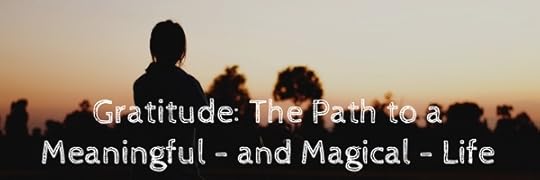
Long after Thanksgiving is over, two things endure – the feeling that I couldn’t possibly eat another piece of turkey… and, more importantly, a deep sense of gratitude.
It will come as no surprise, then, to learn that I recently picked up a book called GRATITUDE by Oliver Sacks. It’s a quartet of essays that he wrote in the last two years of his life. Despite his struggles battling cancer, he chose to highlight his immense gratitude — something he felt not only through that ordeal, but through his entire life.
Here’s what he says about the gifts of old age:
One has had a long experience of life, not only one’s own life, but others’ too. One has seen triumphs and tragedies, booms and busts, revolutions and wars, great achievements and deep ambiguities… One is more conscious of transience and, perhaps, of beauty.
And he concludes:
I do not think of old age as an ever-grimmer time that one must somehow endure and make the best of, but as a time…freed from the urgencies of earlier days, free to explore whatever I wish, and to bind the thoughts and feelings of a lifetime together.
As you gather with loved ones this holiday season, I invite you to allow gratitude to fill your spirit and lead you into the New Year. How? Let Merlin guide you.
While Merlin is beloved around the world as a legendary wizard, the Merlin I’ve written many books about is also a real human being. He has struggles, sorrows, joys, and aspirations – and, hidden deep within him, a remarkable gift. In that way, Merlin is no different from all of us: he is burdened by the human experience, while at the very same time exalted by it.
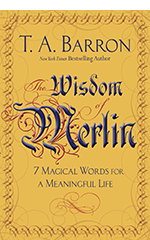 All of us have hidden struggles – and hidden potential. And all of us, like the great wizard Merlin, have something special within us. No matter how many obstacles we face, we still have the ability to reach for the stars. We can strive, create, love, hope, sing, be kind, and work to build a better world.
All of us have hidden struggles – and hidden potential. And all of us, like the great wizard Merlin, have something special within us. No matter how many obstacles we face, we still have the ability to reach for the stars. We can strive, create, love, hope, sing, be kind, and work to build a better world.
Recently, I wrote a book about Merlin’s seven most magical words, THE WISDOM OF MERLIN: 7 Magical Words for a Meaningful Life. I purposely chose Gratitude to be the first of those words. Here’s a passage that explains why:
Gratitude is a good place to begin to make a meaningful life. To be wholly alive is to be grateful—for every breath we take, every song we sing, every person we love, every day we discover.
All we have—truly all we have—is our time and our souls. Even if you live as long as a wizard, that time is really very brief. It’s never long enough to do all you can do and be all you can be.
Each day, take a moment to love a person, a place, or an idea that touched your heart. Cherish those blessings through all the seasons of a year—and all the seasons of your life.
 My favorite place to feel grateful is in nature—under a starry sky in Colorado wilderness, by the vast ocean at the Great Barrier Reef, or in a grove of towering redwoods in California.
My favorite place to feel grateful is in nature—under a starry sky in Colorado wilderness, by the vast ocean at the Great Barrier Reef, or in a grove of towering redwoods in California.
Here’s the miracle of such places: With nature’s wonders all around, I feel both very small and very large at once—diminished and humbled by my own insignificance, while also enlarged and inspired by the vast sweep of creation. And both you and I belong to that creation! For we are all made from miracles, no less than the stars themselves.
One of humanity’s great challenges is to embrace nature without suffocating it—to treat our natural home with appreciation, not exploitation. We have been given the garden planet of the universe—and we can either nurture or devour it, protect or destroy it.
Fortunately, we have one great advantage in facing any challenges: ourselves. We can accomplish anything if we truly devote ourselves to the task.
And that, my friend, is worthy of our gratitude.
This blog entry was originally published on The Huffington Post.
December 7, 2016
Wrapping up my Atlantis Lost Book Tour
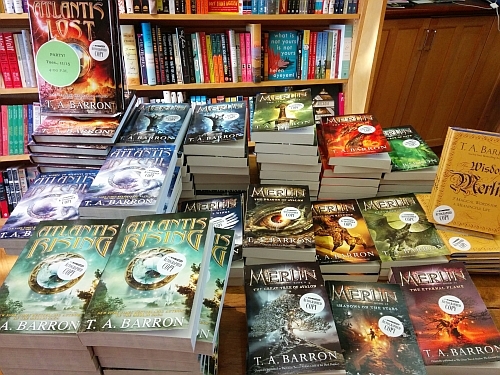 As I wrote about in my last blog entry, I’ve been dashing around the country this autumn in celebration of the release of the third and final book of my Atlantis Saga. Last weekend, after an amazing Thanksgiving with family and friends, I joined readers and friends at two local bookstores to wrap up the tour with some appearances close to home. After more than 20 years I’m no stranger to book junkets, but this tour had its own special magic — the thrill of a new book being released, the joy of seeing readers and fans old and new, and the comfort and warm welcome I felt as I visited with so many of you across the country in celebration of the release of Atlantis Lost.
As I wrote about in my last blog entry, I’ve been dashing around the country this autumn in celebration of the release of the third and final book of my Atlantis Saga. Last weekend, after an amazing Thanksgiving with family and friends, I joined readers and friends at two local bookstores to wrap up the tour with some appearances close to home. After more than 20 years I’m no stranger to book junkets, but this tour had its own special magic — the thrill of a new book being released, the joy of seeing readers and fans old and new, and the comfort and warm welcome I felt as I visited with so many of you across the country in celebration of the release of Atlantis Lost.
I am incredibly grateful to everyone who came out to hear me speak, to have a book signed, and to chat with me not only about the magical world of Atlantis, but also about the fantastical universes of my other books. I received such an incredibly warm welcome at every stop — both at schools and in bookstores — it truly warmed my heart.
This time around, my schedule was long, and sometimes exhausting (plenty of 6:00 am flights!) but each time I arrived in a new city and had a chance to see and speak to all of you, it gave me such energy I felt like I could have run a marathon!
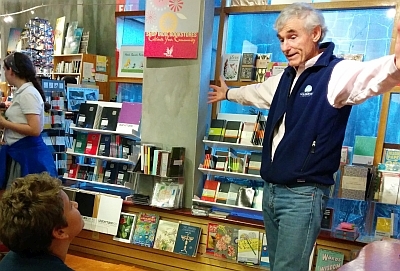
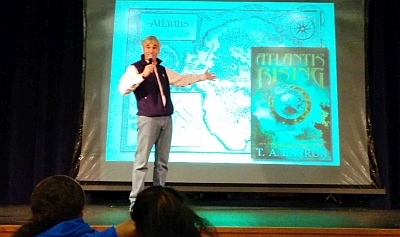

It was especially lovely to see all my friends at some of the schools and independent bookstores across the US who have continued to champion my books through the years. To an author, these people — like readers — are really invaluable, because they are how my stories reach audiences who may not have heard of them yet. I owe a tremendous debt to them, and give thanks every day for their dedication and reader advocacy.
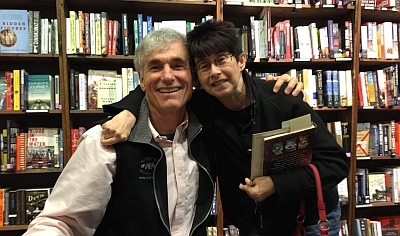 When I wrapped up the tour this weekend back in my Colorado hometown, I saw some familiar faces — the fan in this photo has attended every single one of my events at the Tattered Cover bookstore here in Boulder!
When I wrapped up the tour this weekend back in my Colorado hometown, I saw some familiar faces — the fan in this photo has attended every single one of my events at the Tattered Cover bookstore here in Boulder!
The wrap up of my Atlantis Lost tour marks end of a long road and a lot of hard work. But what a joy it has been to have been a part of it!
November 14, 2016
From the Atlantis Lost Book Tour
I’m more than halfway through the book tour for Atlantis Lost – and what an adventure it has been! I’ve been to 6 cities in 5 states and have been thrilled to meet so many of you and sign your books. And I’ve had some fun experiences along the way, too: I did a Writers’ Workshop at the Book Stall in Winnetka, IL, and I went Live on Facebook for the very first time from that event as well as from the event the following day at Anderson’s in Naperville. If you want to check out those two videos, you can find them on my Facebook page or follow these links: Winnetka Event or Naperville Event.
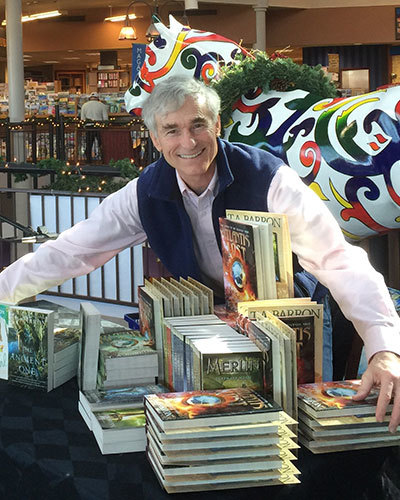
Hugging a big stack of my books before the event at Joseph Beth Booksellers.
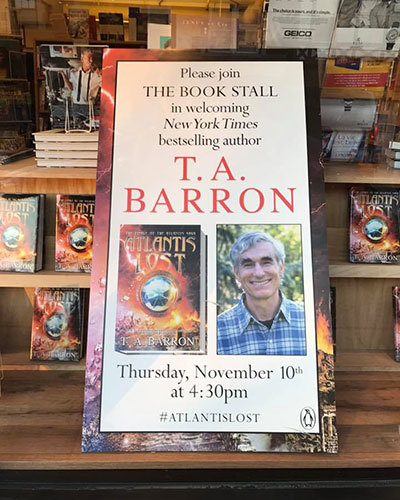
The sign announcing my event at The Book Stall.
I still have a handful of events to go, and I would love to see you! Meeting you, my readers, helps to keep me going while I’m on the road and away from my family.
Here are a few highlights from the tour so far:
In many of the cities I visit, I also get to make a stop at a local school. I love the chance to meet students and see what’s happening in schools across the country.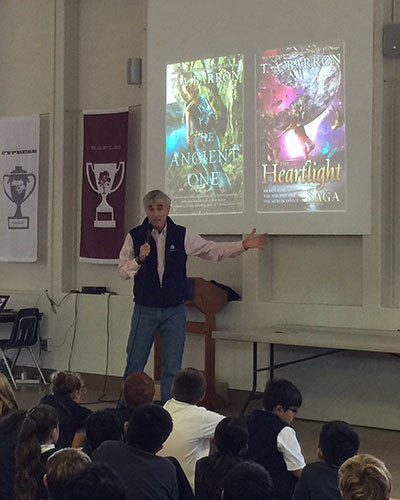
Presenting at a school in Portola Valley, CA.
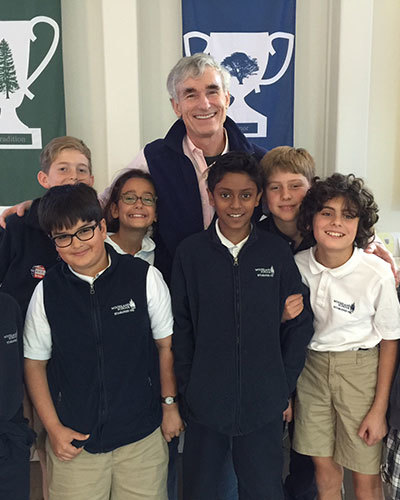
With some of the students from the school in Portola Valley, CA.
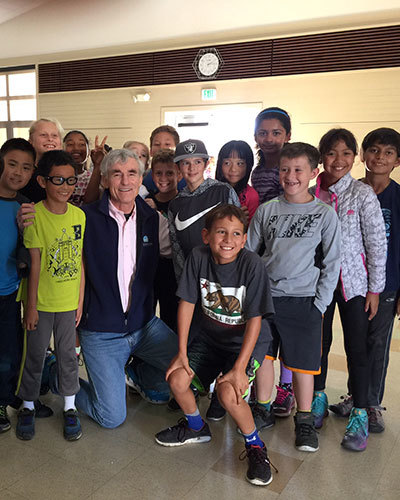
With students from a school in Redwood Shores, CA.
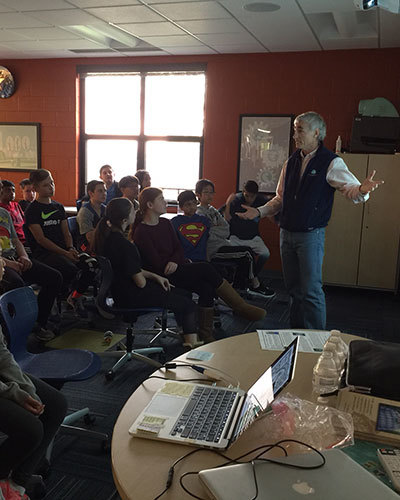
And here I am presenting at a school in Illinois, near Chicago.
And, of course, I really enjoy my bookstore events. I usually do a short presentation and then sign books. I’ll sign any of my books, whether it’s a new edition or old!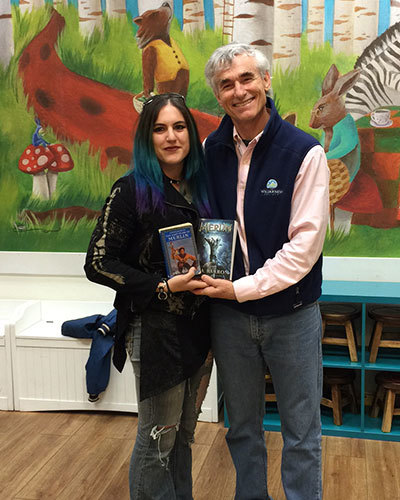
My first book signing was at the Reading Bug in California. Here I am with a fan who grew up reading the Merlin Saga.
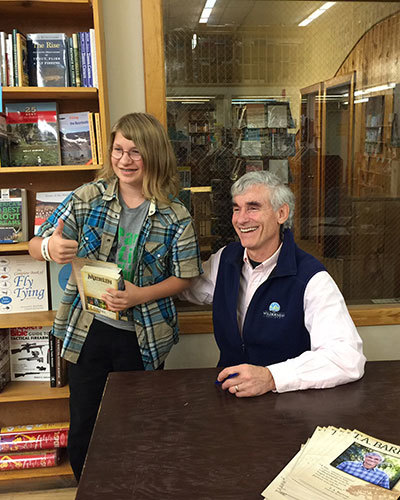
Then it was on to Bozeman, MT, where I met fans, young and old, at the Country Bookshelf.
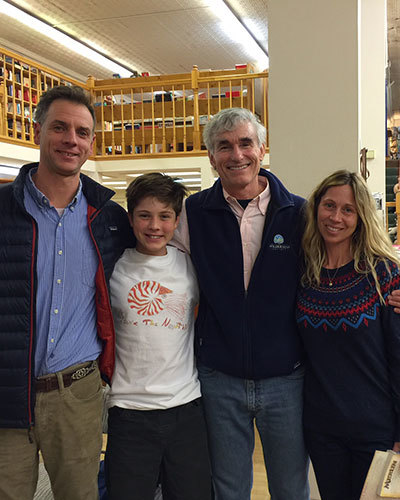
I love when entire families come out to my events, like this one at the Country Bookshelf.
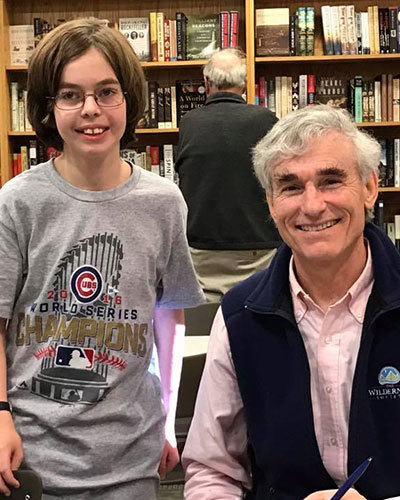
After the Writers’ Workshop at The Book Stall, I signed a few books.
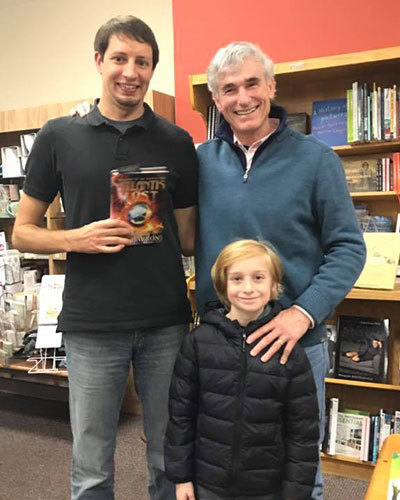
I had a second stop at an IL bookstore the next day, Anderson’s in Naperville.
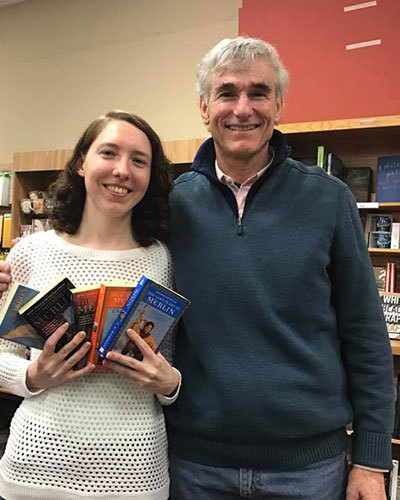
Tina brought some original editions of the Merlin books for me to sign at Anderson’s.
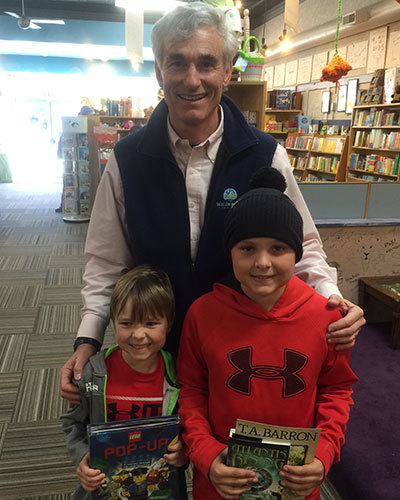
At Blue Manatee in Cincinnati, I met a fan and a future fan!
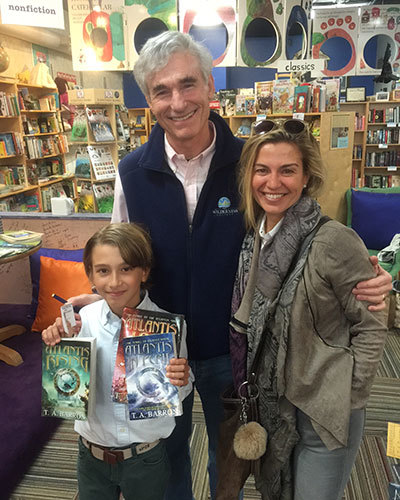
And another reader who will be diving into the Atlantis Saga.
Twice on this tour I’ve been surprised by 2016 Barron Prize winners!
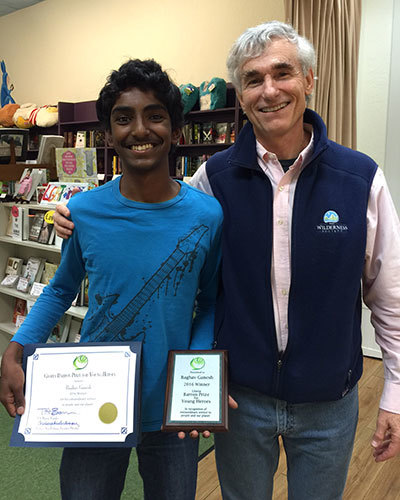
Here I am with 2016 winner Raghav at The Reading Bug in CA.
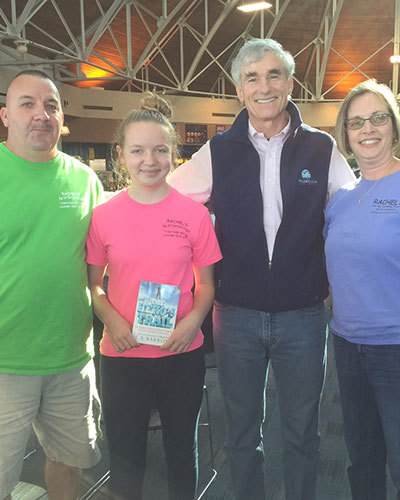
And at Joseph Beth Booksellers in Lexington, KY, I saw 2016 winner Rachel and her family.
I hope you’ll join me at one of the remaining stops on my tour:
Best of Books
November 14 @ 6:00pm
Kickingbird Square
1313 E Danforth Rd,
Edmond, OK
Octavia Books
November 15 @ 4:00pm
513 Octavia Street
New Orleans, LA
Lemuria Bookstore
November 16 @ 4:30pm
202 Banner Hall
4465 I-55 N
Jackson, MS
And a few in Colorado later in November:
Boulder Bookstore
November 26 @ 11:00am
1107 Pearl St
Boulder, CO
Tattered Cover Book Store
November 26 @ 2:00pm
7301 S. Santa Fe Drive
Littleton, CO
October 24, 2016
Atlantis Lost Book Tour!
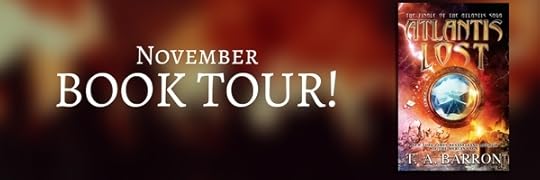
I’m very happy to share that the third book in my Atlantis Saga, Atlantis Lost, is coming to bookstores everywhere on November 8th. In honor of this final installment in the tale of the mysterious, magical island, I’ll be visiting independent bookstores across the United States to do readings, signings, and of course — my favorite part of any book tour — to meet all of you!
Below is the list of places where I’ll be appearing next month — I sincerely hope that if you’re in or near one of the areas I’m visiting that you’ll make time to stop by one of my appearances. What a pleasure it will be to see you — I’m looking forward to it already!
The Reading Bug
November 8 @ 4:00pm
785 Laurel St
San Carlos, CA
Country Bookshelf
November 9 @ 7:00pm
28 W. Main Street
Bozeman, MT
Special Writers Workshop, sponsored by The Book Stall
November 10
Chicago, IL
(stay tuned for more info on this event!)
Anderson’s Bookshop
November 11 @ 7:00pm
123 W. Jefferson Ave.
Naperville, IL
Blue Manatee
November 12 @ 12:00pm
3054 Madison Rd
Cincinnati, OH
Joseph-Beth Book
November 13 @ 2:00pm
161 Lexington Green Circle
Lexington, KY
Best of Books
November 14 @ 6:00pm
Kickingbird Square
1313 E Danforth Rd, Edmond, OK 73034
Octavia Books
November 15 @ 4:00pm
513 Octavia Street
New Orleans, LA
Lemuria Bookstore
November 16 @ 4:30pm
202 Banner Hall
4465 I-55 N
Jackson, MS
September 28, 2016
Inspiring Change Makers
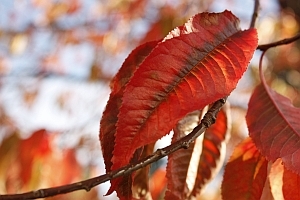 Seasons are a revolving gift—continually different from what has gone before and what will come after. They are the ultimate change makers, with varied weather, foods, holidays, flora, fauna, and activities for us all. Plus a special seasonal magic.
Seasons are a revolving gift—continually different from what has gone before and what will come after. They are the ultimate change makers, with varied weather, foods, holidays, flora, fauna, and activities for us all. Plus a special seasonal magic.
In autumn, now upon us, nature transforms the landscape with a spectacular array of colors, bringing a poignant end to summer. But even as the leaves of trees and plants lose their colors and tumble to the ground…they are making it possible for other seasons to follow. That’s why autumn always makes me feel that anything and everything is possible—every bit as much as spring, the season of renewal and hope.
And if that’s not pure magic—what is?
Nature and young people are my most powerful sources of inspiration. Both share that wondrous ability to transform—both as individuals and as forces affecting the wider world. When I’m hiking on the Mesa Trail above Chatauqua or traversing the western slope of Colorado, I’ve found that nature is a wonderful friend, brilliant teacher, powerful healer and true inspiration. And young people, to my delight, can play all those roles, as well.
Young people combine the energy and idealism of childhood with the realistic awareness of adulthood. (Believe me, I know about their endless energy—having five busy kids!) What’s more, young people want the truth and nothing but the truth. They are honest enough to ask life’s toughest questions. And they still have the courage to hope. To them, literally anything is possible.
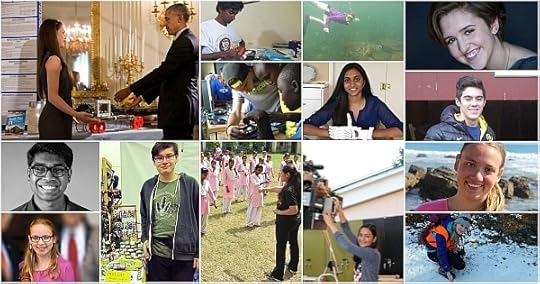
That spirit is perfectly captured by the Gloria Barron Prize for Young Heroes, a prize celebrating outstanding young leaders who have made a significant, positive impact on people, their communities, and our planet. Named after my mother, a devoted teacher, the Barron Prize was founded because every one of us, but especially young people, deserve to hear about real kids who radiate courage, compassion and perseverance. Kids who have made a positive difference to the world. Kids who have discovered that they have the power to act on their ideals. Kids like some of this year’s recently announced Barron Prize winners:
Hannah began her work two years ago after learning that her 9-year-old Ethiopian pen pal, Ruth, was living without a reliable source of electricity. Determined to help, Hannah invented a device that converts the kinetic energy of ocean tides or any moving body of water into usable electricity. She dubbed her invention BEACON — Bringing Electricity Access to Countries through Ocean eNergy. Hannah envisions BEACON being used in developing countries to power desalination pumps (for fresh water), run centrifuges (to test blood), and power electric buoys (for maritime navigation).
After seeing children with disabilities sitting on the playground sidelines watching other kids play, 12-year-old Rachel thought to herself, “This isn’t fair! Someone should do something about it!” and immediately decided she would be that someone. A week later, she presented her idea for a fully accessible playground to her City Council and easily won their support, including the pledge of space in a city park. She has worked tirelessly for two years to raise more than85,000 to build a handicapped accessible playground in her community to benefit children, as well as wounded warriors and their families living in nearby Fort Knox.
Raghav invented SmartWalk, a 21st century version of the white cane used by the visually impaired that includes electronic “eyes” to better help the blind navigate obstacles. His clip-on electronic attachment – housed in a box about the size of two decks of cards — allows users to sense objects well beyond the usual reach of the white cane. As people sweep SmartWalk back and forth, the cane vibrates to warn them of knee-high objects as far as 10 feet ahead. The intensity of the vibration indicates the distance of the obstacle, and the vibrations stop once the path is clear. Raghav worked for months with his local blind center to test his invention. He used funds from a small grant to make multiples copies of the device and donated them to the blind center. In addition, he published the design, making it easy for other non-profits to produce and distribute the device to those in need.
These young heroes give us an idea of our own potential to make a positive difference. On the trail we walk called Life…they show us just how far we can go and how high we can climb. How do they do that? Partly because their actions directly touch other people and make the world a better place. And partly because their examples have great power to inspire others.
Each of these remarkable young people is doing something to help our world. And each of them—I promise—will renew your hope, just as they do mine every year. They are as inspiring as the seasons—and just as magical.
This blog entry was originally published on The Huffington Post.
September 19, 2016
Outstanding Young Leaders: Announcing the Winners of the 2016 Barron Prize
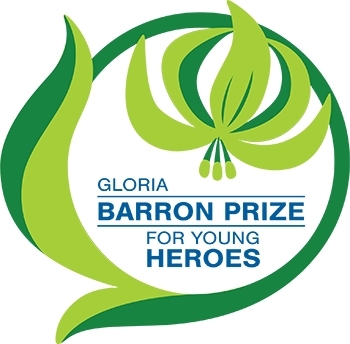 We need heroes today more than ever — not celebrities, but real heroes. And while we tend to hear a lot about entertainers, athletes, and media moguls in the headlines, the world often seems to ignore the extraordinary work done every day by people just like you and me. These are the people not out for fame, but folks who see a need within their community and are driven to make a positive change. The Barron Prize is about celebrating some of those real heroes in our communities: young people with deeply valuable inner qualities such as compassion, perseverance, and humility, whose work to improve their communities can inspire others.
We need heroes today more than ever — not celebrities, but real heroes. And while we tend to hear a lot about entertainers, athletes, and media moguls in the headlines, the world often seems to ignore the extraordinary work done every day by people just like you and me. These are the people not out for fame, but folks who see a need within their community and are driven to make a positive change. The Barron Prize is about celebrating some of those real heroes in our communities: young people with deeply valuable inner qualities such as compassion, perseverance, and humility, whose work to improve their communities can inspire others.
It was because I was so inspired by the extraordinary and hard-working young people doing great things for others that I established the Barron Prize back in 2001. Each year, the prize honors 25 outstanding young leaders ages 8 to 18 who have made a significant positive impact on people, their communities, and the environment. And so, it is my honor announce the truly inspiring winners of the 2016 Barron Prize:
Allison, age 18, of California, who founded Purses for Primates, a non-profit that has raised over $27,000 to protect orangutans and their shrinking habitat.
Anurudh, age 16, of Maryland, who invented the VAXXWAGON, a wheel-powered cooling system that keeps vaccines viable during the final stages of transport to remote locations.
Delaney, age 16, of Florida, who founded The Sink or Swim Project to educate people about global warming and sea level rise. She has made presentations to nearly 10,000 people and has authored three children’s books about climate change.
Hannah, age 15, of Florida, who invented a device that converts the kinetic energy of ocean tides or any moving body of water into usable electricity. Her inexpensive BEACON device is designed to help people in developing countries.
Martin, age 16, of New York, who created Save the Seals, a campaign to raise awareness about the plight of harp seal pups and the Arctic ecosystem as a whole. He has raised nearly $17,000 for his cause by selling seal-themed crafts.
Maya, age 17, of Ontario, who created 440PPM, a documentary film that tells the story of her expedition to the Arctic where she witnessed climate change first hand.
Meghana, age 17, of California, who founded Limbs with Love, a non-profit that creates and provides 3D-printed prosthetic hands free-of-charge to children in need all over the world.
Pooja, age 18, of California, who created For a Change, Defend, a non-profit dedicated to eliminating gender violence and empowering young girls and women. Trained in Taekwondo and street fighting, she has developed a self-defense curriculum and has used it to train over 800 women and girls in the slums and rural villages of India.
Rachel, age 12, of Kentucky, who has worked tirelessly for more than two years to raise $85,000 of the $100,000 needed to build a handicapped accessible playground in her community to benefit children and wounded veterans.
Raghav, age 14, of California, who invented SmartWalk, a 21-century version of the white cane used by the visually impaired that includes electronic “eyes” to better help the blind navigate obstacles.
Riley, age 15, of California, who created Rainbow Pack, a non-profit that has gifted over 9,500 new backpacks filled with school supplies to Los Angeles elementary school students in need.
Ryan, age 17, of Connecticut, who founded TechCorps: Geeks for Good to teach students in the developing world and in impoverished areas of the U.S. how to use off-the-shelf parts to build low-cost computers for their schools.
Samantha, age 19, of Connecticut, who founded SHIFT Scoliosis, a non-profit committed to eliminating the late diagnosis of scoliosis. She and her team have screened over 4,000 underserved children and have taught over 10,000 adults about the signs of the disease.
Story, age 17, of Washington, who created Kids4Wolves to educate young people about wolves and to promote coexistence between wolf advocates and those who oppose wolf recovery.
Xerxes, age 17, of New York, who led a four-year project to mitigate water contamination caused by a farm’s animal waste leaching into New York City’s public reservoir system.



